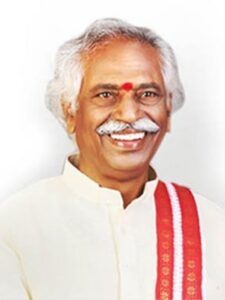CHANCELLOR

Sh. Bandaru Dattatreya (born 12 June 1947) is an Indian politician serving as the current Governor of the State of Haryana since 2021. He was the Member of Lok Sabha for Secunderabad from 2014 to 2019. He belongs to the Bharatiya Janata Party (BJP).
Born in Hyderabad, Dattatreya graduated with a science degree. He joined Rashtriya Swayamsevak Sangh in 1965 and was imprisoned during The Emergency. In 1991, he was elected to the Lok Sabha from Secunderabad constituency for the first time. In 1997, he was appointed party president for the state unit. In 1998, he was re-elected and served as Union Minister of State for Urban Development in the second Vajpayee ministry.
He was elected for a third consecutive time in 1999 and again served as a Minister of State in third Vajpayee ministry. He lost the Lok Sabha election in 2004 and 2009. The party appointed him as national vice-president in 2013. In May 2014, he was re-elected to the Lok Sabha from his former constituency. In November he was made a Minister of State for Labour and Employment in the Modi ministry and became the lone minister from Telangana.
As per Haryana Act No. 21 of 2009 (section 9):
- The Governor of Haryana by virtue of his office shall be the Chancellor of the university.
- The Chancellor shall be the head of the University.
- The Chancellor shall, if present, preside over the convocation of the University for conferring degrees and over the meetings of the court.
- The Chancellor shall have the right:-
- to cause an inquiry to be made in like manner in respect of any matter connected with the administration of finances of the university, colleges or institutions.
- to cause an inquiry to be made in like manner in respect of any matter connected with the administration of finances of the university, colleges or institution.
- The Chancellor shall, in every case, give notice to the university of his intention to cause an inspection or inquiry to be made and on receipt of such notice, the university shall have the right to make such representation to the Chancellor as it may consider necessary.
- After considering the representation, if any, made by the University, the Chancellor may cause to be made such inspection or inquiry as is referred to in sub-section (4).
- Where any inspection or inquiry has been caused to be made by the Chancellor, the university shall be entitled to appoint a representative who shall have the right to be present and to be heard at such inspection or inquiry.
- The Chancellor may, if the inspection or inquiry is made in respect of the University or any college or institution maintained by it, address the Vice-Chancellor with reference to the result of such inspection or inquiry and the Vice-Chancellor shall communicate to the Executive Council the views of the Chancellor and the action to be taken thereon as advised by the Chancellor.
- The Executive Council shall communicate through the Vice-Chancellor to the Chancellor such action, if any, as it proposes to take or has taken upon the result of such inspection or inquiry.
- Where the Executive Council does not, within a reasonable time, take action to the satisfaction of the Chancellor, the Chancellor, may, after considering any explanation furnished or representation made by the Executive Council, issue such directions as he may think fit and the Executive Council shall comply with such directions.
- Without prejudice to the foregoing provisions of this section, the Chancellor, may by order in writing, annul any proceedings of the University, which are not in conformity with this Act, the Statutes or the Ordinances; Provided that before making any such order he shall call upon the University to show cause why such an order should not be made, and if any cause is shown within a reasonable time, he shall consider the same.
- The Chancellor may, at any time, require or direct the University to act in conformity with the provisions of this Act and the Statutes, Ordinances and Regulations made there under.
- The power exercised by the Chancellor under sub-section (11) and sub-section (12) shall not be called in question in any Civil Court.
- Any employee of the University who is aggrieved by the decisions of the Executive Council or the Vice-Chancellor in respect of any disciplinary action taken against him, may address a memorial to the Chancellor in such manner as may be prescribed by Statutes and the decision of the Chancellor shall be final.
- The Chancellor shall have such other powers as may be prescribed by the Statutes.
